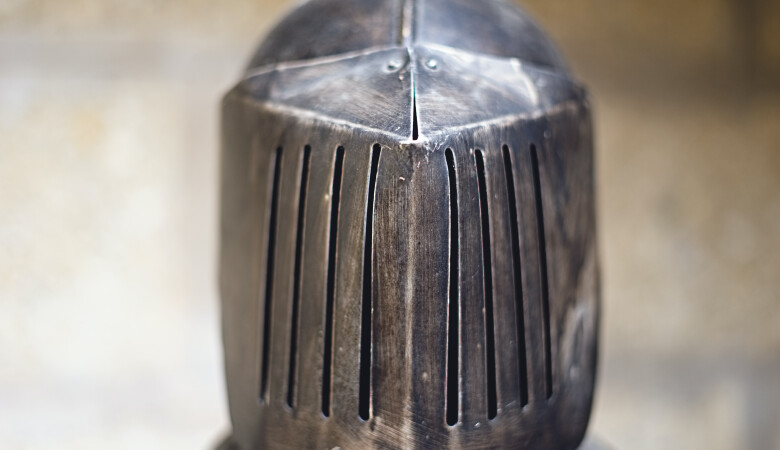Jesus, the Suffering Servant: Part 2 (Isaiah Sermon 61 of 80)
February 01, 2015 | Andy Davis
Isaiah 53:4-9
Atonement
Andy Davis preaches a verse-by-verse expository sermon on Isaiah 53:4-9. The main subject of the sermon is Christ, the unblemished lamb, being sacrificed for His people.
- SERMON TRANSCRIPT -
So how would you define a miracle? If somebody were to ask you what is a miracle, what would you say? And one definition that, it's not a careful definition, but be anything that causes surprise or wonder or amazement that violates in some way the laws of nature and there's no natural explanation for it, and it gives evidence for the existence of God. Now, I would have to say that this book, this Bible, that I hold in my hand is by any definition you give of a miracle, is a miracle, is a miracle. Now why would I say that? It's because of the existence of specific predictive prophecy that violates the law of nature of the consecutive events of Monday, then Tuesday, then Wednesday, then Thursday and then 2012, 2013, 2014, the consecutive flow of evening and morning the first day, evening and morning the second day. We cannot know the future. Only God can know the future and as we come to Isaiah 53, we come to the greatest single predictive prophecy in the Bible. Now, how do we know that this was a prediction? Maybe given how specific Isaiah 53 is about Christ, maybe it was written after the fact. Well, it wasn't.
A few years ago, I had the privilege of going to see the Dead Sea Scrolls in Raleigh. Maybe some of you went as well. And as you look down at these little fragments and you understand some of the history of where the Dead Sea Scrolls came from, and it's just an amazing story. In 1947, a Bedouin tribe boy was looking the story goes for a stray goat I think his name was Muhammad and not the goat the boy. And he was looking for a stray goat. And there are these steep cliffs in the Qumran area, the West side of the Dead Sea, eight miles South of Jericho. And as he was looking, I don't know what this had to do with finding a goat but he threw a rock into a cave and as he did, he heard the sound of breaking pottery. And it intrigued him and he made a really amazing effort, to get to the cave because it's nestled on the side of a cliff and as he was in there, he found on the floor of the cave an amazing sight several large jars containing leather scrolls wrapped in linen cloth. And because some of those jars were tightly sealed. When they are opened the scrolls, inside were preserved in excellent condition, and he took the scrolls to a Muslim sheikh in nearby Bethlehem, the sheikh couldn't read them, sent them to a Syrian monk that he knew and eventually, the largest of the scrolls the Isaiah scroll was sold to a Muslim antique dealer.
The original price was 20 pounds, the dealer couldn't believe the scrolls were that old they settled on a sum of less than $30. Eventually they came into the hands of someone who understood the significance of them and because of a particular war that was going on in that region, soon they were brought across the ocean to New Jersey, amazingly. And at one point, I'm not saying anything negative about New Jersey, I need to be very careful, but just they were there.
And even more amazingly on a certain date in 1954, they were put on sale through a want ad or something like that in the Wall Street Journal. You can look this up, there's actually the ad, Dead Sea Scrolls on sale, etcetera, willing... I'm thinking, 1954, that would have been an incredible time to buy the Dead Sea Scrolls. Imagine if you owned the Dead Sea Scrolls, showing them to all your friends. It would be amazing. But they were bought by someone from... An Israeli who understood their significance, and brought back to Israel for the sum of $250,000. Now, the Isaiah scroll from the Qumran community is the most significant of all the Dead Sea Scrolls. Scholar William Albright dated the scroll at 125 BC. Now we know the significance of the letters BC. That's before Christ, a century-and-a-quarter before Jesus was born. This prediction that we're looking at today was clearly written. Now, since that time the carbon-14 dating on that, puts it even further back maybe as far back as 230 BC, almost two and a half centuries before Jesus was born, this predictive prophecy was written. Now, we know just big picture history, they were written long before that. Long before that, seven centuries before Christ was born. Now, that's amazing, it's incredible.
But the real miracle of all of this is none of that, the real miracle is this: How does salvation for sinners like you and me come from such a Holy God? Now, that's the real marvel in all of this. How can this thrice Holy God proclaimed in the Book of Isaiah, holy, holy, holy. The one whose eyes are too pure to look on evil, he cannot tolerate wrong. It says in first John 1, "God is light, and in him, there's no darkness at all." This God who gave the law at Sinai and who upholds it with all of his heart, how can a God like that, accept wicked sinners like you and me? If they just simply believe in the gospel message that I'm going to get to preach today, they can be justified, they can be made right in the sight of such a Holy God.
As it says in Romans 4:5, "However to the man who does not work but trusts God who justifies the wicked, his faith is credited him as righteousness." I mean what a phrase, what a, to some degree, what a scandal. A God who justifies, or declares for all time, not guilty, the wicked. As it says in Romans 5:6, "You see, at just the right time, when we were still powerless, Christ died for the ungodly." Now, this is absolutely astonishing. The normal way that people think or understand God is this: God punishes bad people and rewards good people. That's just what he does. But the Gospel says actually, that God declares wicked people to be innocent. God treats the wicked, the ungodly as though they were righteous. More than that, in the fuller teaching of the Bible, God actually adopts them as his sons and daughters, and takes them to live with him forever in his holy dwelling place in heaven. He does this to wicked people. Friends, that's a stunner. It's... Actually, it goes so far as to be seen as a scandal, if you see it one way. But if it were not so, every last one of us would be lost. We would all sink under the fiery wrath of his justice and we would all of us, every one of us be condemned eternally.
Isaiah 53 is the clearest chapter in the Bible on the central mechanism, if we could use that language. The central mechanism of our salvation. How it is that all of this happens? Substitutionary atonement. Substitutionary atonement. The idea that our sin, our guilt, our wickedness can be transferred from us to a substitute and his suffering and his death can completely atone for it all, all of our law-breaking. The eternal Gospel, this timeless message of salvation through a substitute sent by God was proclaimed with crystal clarity an amazing seven centuries before Jesus Christ was born, in the chapter we're going to look at for the second week today. Now last week, I laid out a five-part outline of this section of Scripture, this chapter, including Isaiah 52:13-15. Five sections, each of them three verses long, a total of 15 verses.
First, in Isaiah 52:13-15, we saw Christ repulsive but redemptive then exalted and glorified. In verses 1-3, we see Christ the arm of the Lord but human and despised. Now today, we're going to see in verses 4-6, Christ rejected but our atoning substitute. And then in verses 7-9, Christ innocent but willing to be slaughtered. And then next week, God willing, we're going to finish up with Christ crushed so we could be justified.
I. Central Message of Isaiah 53: Substitutionary Atonement
Now, as I've said, the central message of all this, of Isaiah 53 is substitutionary atonement. This is the central work of the One depicted here, the servant of the Lord, who we know is Jesus Christ, the servant of the Lord. Look at verse 11, it says, Isaiah 53:11 says, "By his knowledge, my righteous servant will justify many." Justification, the work of the servant of the Lord here is justification. What does that mean? It's the declaration by God, the Judge, that we are innocent, that we are not guilty, that we're righteous in his sight.
Now, the substitutionary aspect is unfolded very plainly in verses 4-6. Look at it, and we're going to be studying this today very carefully. But it says there, "Surely he took up our infirmities and carried our sorrows, yet we considered him stricken by God, smitten by him, and afflicted. 5 But he was pierced for our transgressions, he was crushed for our iniquities; the punishment that brought us peace was upon him, and by his wounds we are healed. 6 We all, like sheep, have gone astray, each of us has turned to his own way; and the LORD has laid on him the iniquity of us all."
That is substitutionary atonement. The atonement comes from language like peace and healing and all of that. And the substitutionary aspect is what he did for us, how our sin and guilt was put on him. So also look at verse 8, "He was cut off from the land of the living. For the transgression of my people, he was punished." Again, substitution and atonement. And then in Verse 10, "It was the Lord's will to crush him and cause him to suffer, and the Lord makes his life an offering for sin." Again, substitutionary atonement.
The Possibility of a Transfer of Guilt (Leviticus 16)
Now, at the core of all of this is the very possibility of the transfer of guilt to the substitute and of righteousness from the substitute to us. The very possibility that that could even happen is openly questioned in our day as it has been questioned, how could it be? NT Wright, a British scholar, who was recently here at Duke came and many heard him speak, etcetera. He said this. He said, "If we use the language of the law court, it makes no sense, whatever, to say that the judge imputes, imparts, bequeaths, conveys or otherwise transfers his righteousness to either the plaintiff or the defendant." Do you hear that? Makes no sense to say that. "Righteousness is not an object, a substance or a gas which can be passed across the courtroom," so says NT Wright. But the transfer of guilt to the substitute is the essence of the animal sacrificial system that Jesus fulfilled.
And if you look at Leviticus 16, don't go there now, but just listen to what it says. In Leviticus 16:21, we have this moment which the high priest Aaron puts his hands on the head of a live goat. I'll just read it. Leviticus 16:21, "And Aaron, [the High Priest] "shall lay both his hands on the head of the live goat," and listen to this, "and confess over it all the iniquities of the people of Israel and all their transgressions, all their sins, and he shall put them on the head of the goat and send it away into the wilderness." Well, listen, if that's not a transfer of guilt symbolized, and I'll just say symbolized there, then what is it? It says it very plainly. He's putting the sins, he uses three different words, on the goat and sends the goat away.
Transfer of guilt is of the essence, of the animal sacrificial system that it can happen. The incredible good news of the gospel is that guilt can be transferred to a substitute and he dies what we deserve and his righteousness can be given to us and we can stand in that blameless-ness that perfect robe of righteousness for all eternity, that's the gospel dear friends, that's the good news I get to get up here and proclaim today and every week. And all of this happens by faith, by simple faith, not by works. We already heard the verse, the man who does not work, but trusts God, it's by faith, not by works.
If you look at verse one of Isaiah 53, it says, "Lord, who has believed our message," who has believed our message, "and to whom has the arm of the Lord been revealed." So here we have this language of faith, belief. There's a need for belief here, belief in a message, a specific verbal message, a verbally proclaimed message. And so this message is going to go out to the ends of the earth in Isaiah 52, at the end of the chapter to hear Joshua read. Kings are going to hear about this, they're going to hear just to the ends of the earth, all these different kings are going to hear what they haven't been told they're going to hear someday and they're going to shut their mouths because of him. So this message is going out in verse 1, who has believed our message. And Jesus doesn't appear to be a savior to us, there's nothing in his appearance there, no beauty or majesty to attract us to him. Nothing compelling in how he looked. So you have to see the savior of the world, differently than just with the eye, even if you'd lived at that time, you had to see him by faith, only by faith.
Lord, who has believed our message as you hear the message, proclaimed, you hear it with your ear you have to believe it with your heart and the verse, verse one implies that cannot happen unless God reveals it to you. Cannot happen unless God reveals it. And so this explains how you can have two people sitting side by side. They're both hearing the exact same message. One of them hears and believes and is saved the other one not. God has to reveal it to you even now, even today. You'll be able to listen to this whole sermon and walk out unconverted. It's possible, actually it happens all the time. But we have prayed that God would reveal his arm to you the arm of the Lord, the display of his power in Christ crucified and resurrected and so if it's revealed you will be saved.
And the last time we saw Christ exalted in the end, Isaiah 52:13, but first totally degraded beyond human appearance, and in his degradation in his just being totally crushed and abased, Isaiah 52:14, in that way. He's going to sprinkle many nations, sprinkling is the language of atonement, his blood will sprinkle them and they'll be atoned for. Isaiah 52:13-15 now, Christ simply grew up out of nothingness. He was a normal human being in appearance, nothing noteworthy, nothing in his appearance noteworthy. He wasn't unusually tall or unusually handsome or unusually glorious in just visually appearance. There's no glow around him like the angel the night that Jesus was born, except on the Mount of Transfiguration, that one time. So it's nothing in appearance, not at all. And he grew up like a tender root out of dry ground, meaning I think that's talking about Israel in general and it talks about the promise to David and the fact that Davidic line was just so humbled by the Gentile overlords and that the whole thing was... Seemed to have come to an end. And in Verse 3, "he was despised and rejected by men, a man of sorrows, and familiar with suffering, like one from whom men hide their faces he was despised," thought little of, underestimated "and we esteemed him not," saying about the same thing twice.
II. Christ Rejected, But Our Atoning Substitute (53:4-6)
So that brings us now to today's section, now look at verses 4-6, Christ rejected, but our atoning sacrifice. Verse 4, "Surely he took up our infirmities and carried our sorrows, yet, we considered him stricken by God, smitten by him and afflicted." So Christ is characterized by amazing sorrows. We already seen that in 52:14, but they really were not his own. They weren't really his, they didn't, in some way, they didn't belong to him. The human eye if you'd lived back then, and seen all this seen his arrest, his beatings, flogging. Whole thing, carrying the cross, crucifixion, death. If you'd watched all that, you would've seen it... You wouldn't be able to see just by looking what's really going on, wouldn't be obvious to you. The people who watched Jesus go through all of that, his arrest, his floggings, his trial, all of that whole thing, and then his crucifixion and his death.
Most of them would have come to the wrong assumption. They would have seen that he was in some way a criminal, he was getting what he deserved, he was getting punished, he must have done something wrong. Even those who had hoped that he would have been the one who was redeeming Israel had hoped he was the Messiah, would have wondered now because of what's happened here, maybe we misread him, maybe there was some secret crime or some wickedness in him in some way. So the total repudiation by God here. And so, they would misunderstand, his bitterest enemies would have felt totally vindicated by his death. "See, he's not who he claimed to be. If you're the Son of God, come down off the cross and we'll believe in you," they said. It proved positive that he was a sinner, that God, he was under a curse, this was absolutely... This was an open and shut case, it was a slam dunk. If you die on a tree, you're under a curse, there's no way you could have a cursed Messiah. It's impossible. They would have misunderstood what was going on.
And you see how totally alone he was as he bore our sins, there he is out in front of us and there's this whole he, we analogy. He was going through this and that was our sins that he's bearing and so he's on his own here. He took up our infirmities, he carried our sorrows.
Carrying Our Infirmities and Sorrows
Now you have to go back and understand who he was, the eternal Son of God, sitting on a throne of heavenly bliss of peace and joy and perfect order in his heavenly life, pre-incarnation. And he willingly entered an ocean of misery on earth. He willingly did that, knowing full well what was going to happen. Lepers whose skin was covered with bloody sores, paralyzed people whose legs lay limp and hadn't moved in years. People born blind, who had never seen color. Women bleeding for years and ceremonially unclean. Disease and death, demon possession, running a mock. And beyond that worse than all of that, of course, is the crushing burden of the guilty conscience of all these sinners that he came to save. Knowing the adultery, that you committed with your neighbor's wife or husband, nobody's ever discovered it yet, but you know, and you know God knows. And you're afraid of his wrath and his judgment and your conscience is defiled and polluted. And you know, no animal sacrifice can take that away and you deserve eternal condemnation because of your guilt and your sin, and it's just crushing. And that's the ocean of sin and disease and death that Jesus willingly just plunged into knowing full well some swamp of defilement that he dove head first into for us.
And these infirmities, and these sorrows that he took up were ours, they belonged to us. They were not his, but he took up our infirmities it says, and he carried our sorrows, picture kind of a physical lifting action here, this big heavy weight crushing us. And he comes alongside and just lifts it off of us. I really can't say these words without picturing him lifting the cross. This heavy wooden thing that he carried up the hill Golgotha, and he's just lifting this up. You think about the Old Testament, think about Samson. Remember that story about how he ripped up the city gates, bars, bolts, all of it and goes up to the top of some hill and throws the thing. I would love to have seen that. That would have been awesome. What a display of physical strength. Jesus is stronger than Samson. If you know what it is he lifted and carried, infinitely stronger than Samson. He took these up of, off of us. He lifted our burdens off of our guilty consciences.
The Cross Clearly Predicted and Explained
And the cross clearly predicted and explained here. Look at verse five. In one verse, really verse five, I think clearly predicts and explains the cross more than any other single verse in the Old Testament. "But he was pierced for our transgressions. He was crushed for our iniquities. The punishment that brought us peace was upon him, and by his wounds we are healed." I would just love if all of you would just memorize that verse. Each of its four parts, and cherish them for the rest of your lives. Just take up each phrase and look at it. Four words describe Jesus's death on the cross; pierced, crushed, punished, wounded. This is the suffering servant, this is... No way this could have been the Jewish nation as a whole or any other individual, no way. They stumble over the stumbling stone, they can't... They expected a triumphant world-conquering Messiah hero, and so Jesus will be more than they can possibly imagine. He will be.
But they didn't understand God's righteous wrath against them for their sins, all of us underestimates that, how angry God would be apart from Christ at us. We underestimate our sinfulness and so... Also the Jewish nation, the part that doesn't believe in Jesus, just doesn't understand how they needed not immediately a triumphant conqueror King Messiah, but a suffering servant Messiah to take care of their sins. We underestimate our sinfulness. Simply put, a death penalty had to be paid, had to be. God told Adam, "you must not eat from the tree of the knowledge of good and evil, for when you eat of it you will surely die." The serpent tempted in reference to that, you will not surely die, but it was true, God always speaks the truth. So the wages of sin, we're told, is death. Sin and death are linked, that's how death entered the world.
It says in Ezekiel, "The soul who sins will die." So death penalty had to be paid and Jesus paid the death penalty for his people, for our sins. And see the clear assertion in verse five, "he was pierced for our transgressions, he was crushed for our iniquities." It's talking about our sinfulness. We are transgressors, we've committed iniquity. We're at war with God and so we need to be brought to peace with him and we're his enemies, we're diseased, and dying, and we needed to be healed. That's the language coming from verse five, that's us. This pure substitution language, he and our, us. Now look at the mode of death clearly predicted here, pierced. These words just don't go away. They don't go away like the morning mist. They're words. They're specific words, they just don't disappear like the word sprinkled in the previous section. Sprinkle just doesn't go away. It's an interesting word. And this word pierced just stands there and testifies about how he would die.
And three different prophecies actually predict the piercing of Jesus. When you think about piercing, you think about a membrane like a wall or something like that, and something sharp, penetrating. Going through like that. That's what the word pierce means. Like pierced ears or different things. There's a piercing. There's a membrane. Something is piercing through. It's penetrating. So this word doesn't just disappear. We don't talk it away like it's some poetical metaphor or something like that. Three different prophecies talk about it. This one, in Isaiah 53, but it also have it in Psalm 22 and verse 16. "They have pierced my hands and my feet," David wrote 1000 BC. Wow. They have pierced my hands and my feet. Pierced. And then again in Zechariah 12 and verse 10, "They will look on me, the one they have pierced." Interestingly, three different Hebrew words behind that. Different but piercing all three times. And the amazing work is effective. He's pierced producing peace and healing. Peace with God. Look at the punishment that brought us peace was upon him. Oh, the joy of being able to just say this.
Romans 5:1, "Therefore since we have been justified through faith, we have peace with God through our Lord Jesus Christ. Apart from Christ, God is at war with us and we with him. We are enemies, but through faith in Christ, we have peace. There's a holistic word here. The word in Hebrew is Shalom. It's a full rich peace here. Picture prosperity. Like sitting on your own vine and fig tree, and eating from it, and being happy like the harvest is in, and you're sitting on the front porch, drinking iced tea. I don't think they drank iced tea back then, but picture it now. There's just this complete feeling of health and peace, and success, and prosperity, and every good thing in life. That's Shalom. It's a full rich word. And by his piercing we get peace. That's what happens. By his wounds, also it says we're healed. There's that word healing, healing in body and soul. We're diseased. We're dying. All of us aging and dying. There's aches and pains and beyond that, there's tumors and diagnoses and PET scans and all kinds of things going on in this congregation. We're dying. And if the Lord doesn't return in our generation, we will all of us die. It's appointed to us to die. But by his wounds, we will ultimately be healed, completely healed.
Verse 5 Abused and Perverted by the Prosperity "gospel"
Now, I am not a prosperity gospel teacher. I'm not a health and wealth guy. This is their favorite verse I think. By his stripes we're healed, that kind of... The stripes. By his wounds we're healed. Friends the healing that Jesus intends is far greater than anything that we've ever seen here on Earth. It's far greater than that. Far better. It says in Revelation 21:4 that there will be no more death, or mourning, or crying, or pain. Why? Because the old order of things has passed away and everything's new. The prosperity gospel people have forgotten that part. We're still in the old order of things. Therefore there's still death, mourning, crying, and pain every day. But someday, after the resurrection all of you redeemed by the blood of Christ, you're going to be in resurrection bodies so glorious I can scarcely describe to you how good it's going to be. I can't, but Paul does in 1 Corinthians 15, verses 42 through 44. He says, "So will it be with the resurrection from the dead. The body that is sown is perishable. It is raised imperishable. It is sown in dishonor. It's raised in glory. It is sown in weakness. It is raised in power. It is sown a natural body. It is raised a spiritual body." Whatever that is. That's the resurrection body. It's a spiritual body, and in it, you will spend eternity. "The righteous will shine like the sun in the kingdom..." That's the healing Jesus bought by his wounds. Nothing less than that.
We, The Constantly Wandering Sheep Have Been Atoned For!
Now we, the constantly wandering sheep, we have been atoned for. Look at verse 6. A very... Probably the most famous verse in Isaiah. Perhaps, "Holy holy holy," may be close. But Isaiah 53:6, "We all like sheep have gone astray. Each of us has turned to his own way, and the Lord has laid on him the iniquity of us all." This constant wandering into wickedness has ever characterized God's sheep. It characterizes us still. You know, Robert Robinson wrote in 1757, a famous hymn, Come Thou Fount of Every Blessing. In that he says very famously, "Prone to wander Lord I feel it. Prone to leave the God I love." Any of you testify to that? Any of you be able to say, "That is me?" It is me. I am prone to wander like a sheep. And I want to be cured of it. I yearn to be cured of my wandering ways, my wandering mind, and wandering eyes, and wandering life. I don't want to leave the straight and narrow way. The way of holiness that Christ has laid out for us. He is the way and the truth in life. I don't want to do anything except what Christ would do. Think anything but what Christ would think. Love anything but what Christ would love. That's what I want, but I wander.
Romans 7 says we struggle with our sins, all the time. And this wandering, we do, we're following our own way. Notice that all we like sheep have turned. Each of us to his own way. We all want to be our own kings and queens. We want to define a good life for ourselves. Instead we ought to say, "Oh Lord, what is your will? What do you want me to do? You're the king." And this wandering was not innocent. It was not an accidental wandering. It's wandering into wickedness. Willful wandering we did. And God took all of that wandering and all the effects of it, and laid all of that on Jesus and killed him for it. Powerful. Powerful. Transfer of guilt. Now may I say to you in the face of such an eminent scholar as NT Wright and others that say that the transfer of guilt cannot happen, the transfer of righteousness cannot happen, can I give you three words in reference to that? The transfer of guilt is core of the gospel. Without it we have no gospel. The transfer of guilt is possible, essential and accomplished.
It's possible because God's the king and he says so end of story. And if he says, he can transfer guilt, then he can do it. That's the good thing about being king. King of kings and Lord and Lords. You can do that. Now, you might say, "What about justice?" Can I tell you God's commitment to justice is infinitely greater than you can possibly imagine. He killed his Son rather than letting us into heaven, un-atoned for. None of us can question his justice none of us. But he says the transfer of guilt is possible.
Secondly, the transfer of guilt is essential. Without it we go to hell, if we stand guilty before him on Judgment Day, we will go to hell, we'll be condemned. So the transfer of guilt must happen, it must, and thirdly, it has happened. We are proclaiming an accomplished fact. Jesus died. Right before he died, he said, "It is finished." What is finished? Transfer. It's done. I have died in the place of my sheep.
III. Christ Innocent, But Willing to Be Slaughtered (53:7-9)
Now, in Verses seven through nine, we have Christ innocent, but willing to be slaughtered. "He was oppressed and afflicted yet he did not open his mouth. He was led like a lamb to the slaughter and as a sheep before it shearers is silent, so he did not open his mouth." The focus here is on Christ's willingness to be slaughtered. His suffering is made plain again, he's oppressed and afflicted, this overpowering sense of Jesus being overpowered, humiliated, defiled like the Jews, when the Egyptians ruthlessly used them as slaves. So we see this in Jesus being beaten to a bloody pulp, spat upon, mocked with crowns of thorns, purple robe, led through the streets of Jerusalem to be screamed at by the crowd, stripped, nailed, lifted up, crucified in agony, he's oppressed and afflicted. The single greatest display of human injustice, in all of history, and yet amazingly, the greatest display of God's justice in all of history. That's how he put his justice on display.
Romans 3:25-26, "God presented him as a sacrifice of atonement, through faith in his blood. He did this to demonstrate his justice, because in his forbearance he had left the sins committed beforehand unpunished. He did it to demonstrate his justice at the present time, so as to be just and the one who justifies those who have faith in Jesus." He is both just, righteous, and he justifies sinners. Both. Why? Because of the cross. Yet, in all of this human injustice, Jesus didn't once open his mouth, isn't that amazing? He's up in front of the high priest, and he's not saying anything. The high priest stood up before them and said, "Are you not going to answer? What is this testimony these men are bringing against you?" But Jesus remained silent, gave no answer. Did the same thing in front of Pontius Pilate to the Governor's great amazement. He didn't say a word. Why? Well, he did this because he really was our substitute. He really was in that substitutionary sense guilty and he was acting like a guilty person should in that situation. Brought before the bar of God's justice there's not a single thing we can say to him. Nothing. It's all true. It's all true.
Job put it this way, in Job 9, "How can a mortal be righteous before God? Though one wished to dispute with him, he could not answer him one time out of a thousand." And you'd be wrong on that one. 999 of the accusations, you'll just say, "Guilty, guilty, guilty, guilty. Oh wait, about that one." "Alright. Let's talk about it. Guilty." And so there's nothing we can say. At the end of Job in Job 40, he says, "I put my hand on my mouth. There's nothing I can say. I repent in sack cloth and ashes. I'm a sinner." Jesus was acting that out by being silent and he went willingly to the cross, he knew what was going to happen, the sheep and the goats and the calves and all of those animals never knew what was going to happen to them. They're animals, they didn't know.
But Jesus knew exactly what was going to happen to him. Exactly. And he did all of this in Verse nine. "Though, he had done no violence nor was any deceit in his mouth." Jesus's sinless-ness must be upheld, he never committed any sin. Never. Now, his sinless-ness isn't openly taught here in Isaiah 53. It's hinted at but it's not openly asserted that he was just universally sinless. But what it does do in verse nine, it says, "Though, he had done no violence nor was any deceit in his mouth." All of this abuse seems to be disconnected from his life and his performance. So it implies his sinless-ness. But other verses openly teach it. You remember how the Passover lamb had to be without blemish, or defect? So Jesus was asserted as a lamb without blemish or defect in 1 Peter 1. And then in 1 Peter 2:22, it says, "he committed no sin, and no deceit was found in his mouth." Christ's sinless-ness is essential for substitutionary atonement. If he'd been a sinner in any way, he would have been just suffering for his own sins, but instead he was suffering for ours, because he had no sin to suffer for.
How did he accomplish that? By being a mighty warrior, against Satan. Satan tempted him again and again, not just in the desert, but every day, you know how he left him and came back in an opportune time, I think it was like later that day. Day after day, he bore the temptation. You remember the story about Samson, killing 1000 Philistines, with the jaw bone of a donkey? Wow, how do you kill 1000 warriors with the jawbone of a donkey? Answer, one at a time. They are not... A jawbone of a donkey is not a weapon of mass destruction, it's a weapon of one at a time, destruction. Jesus is a greater warrior than Samson. He took all of Satan's temptations, and killed them all, all of them lay dead at his feet, his whole life. And that's awesome. And what's beautiful is we get to step into that perfect record of righteousness and be as righteous as that by imputation. It's amazing, we get to be seen as obedient as Jesus.
Christ’s Death Predicted
And he went willingly to the cross knowing all that would happen to him, he died for us. His death is predicted in verse eight and nine, "By oppression and judgment, he was taken away and who can speak of his descendants?" NIV says, "For he was cut off from the land of the living, for the transgression of my people, he was stricken. He was assigned a grave with the wicked and with the rich in his death." So Jesus didn't merely suffer torture, he wasn't merely pained, whatever, he died. Right here in the text he died. Look at verse eight, "He was cut off from the land of the living." What does that mean? It means he died. Poetical way of saying he died. Cut off from the land of the living, and it talks a moment later, about his grave. Who needs a grave? A dead person. So he definitely died in this text.
It also speaks technically in the Hebrew of how he went from arrest, to judgment, to death. Ordinarily, you go from arrest to judgment, back to prison for a time, and then from that, to death. They were in a rush to kill Jesus. So he goes literally from arrest, to judgment, to death, and that's what happened right here in this verse. Verse eight is mistranslated a little by the NIV. It says, not "who can speak of his descendants," but rather it's something like this, "As for his generation who considered that he was cut off from the land of the living." So people of his own time did not meditate upon his death properly. They didn't consider it properly. They didn't stop to think about it properly, they didn't ponder it appropriately. Friends, we're going to rectify that for all eternity. We get to ponder it appropriately for eternity, and get to consider it properly for all time.
Finally, we talk about his mysterious burial. It says in verse nine, "he was assigned a grave with the wicked and with the rich in his death though he had done no violence, nor was any deceit in his mouth." Jesus was counted wicked as he died. But being counted wicked and dying with the wicked are two different things. So he actually, to fulfill this, had to die with other people. And so he did. He was in the middle and one was crucified on the right and the other at his left, fulfilling this detail. He died with the wicked, not just that he was considered wicked, but he was just... He died with them and therefore he would have been buried with them too. You understand that? Why would the Romans treat him any different than the other people that died? All three would have been buried in a common grave, right? They would have dug a common grave and thrown the three bodies in there and covered them with dirt, but that would have ruined the physical evidence of Jesus' resurrection that came when Joseph of Arimathea and Nicodemus came and treated him like a king and buried him like a king.
You know the story in John 19, how Joseph of Arimathea suddenly amazingly got courage of their faith, which they never had when Jesus was alive and doing miracles. But now that he's dead, they suddenly got courage, where? From the Holy Spirit because there was a prophecy that needed fulfilling. I don't even think they were aware or thinking about Isaiah 53, they just wanted to bury Jesus. And so they went and asked Pilate for Jesus' body and they took spices. 75 pounds worth, they buried him like a king. And they wrapped him up in these strips of linen and they get a very special tomb for him, a grave, a rich man's tomb. And they bury him there and it becomes the launching pad for the church of Jesus Christ. That empty tomb. Because on the first day, the Resurrection Day, they go and the stone has been rolled back and the women go and see.
And then John and Peter run to see the physical evidence. You remember the story in John 20? And John, the younger one gets there first and looks in but he's afraid to go in and he sees the strips of linen lying there and the head cloth folded up by itself. The things in like in a cocoon shape, I think, his body because it was sticky resin and all that. How do you get that out? Jesus just moved through it, out, and they were looking and then Peter just goes in and just, that's what he did. That's how he was. And he just went right in and he looks around and he went away wondering. But John, it says, "Saw and believed." So the physical evidence of the resurrection was the ground for John's faith in the resurrection. But then he says, in John 20:9, he "still did not understand from scripture that Christ had to rise from the dead." You know why he said that? Because we don't get to touch the grave clothes, do we? We don't get to go to the empty tomb. Don't believe whatever it says in Jerusalem. "No, it's right here, here's the empty tomb." It's like, Maybe. But how can we ever know? What we get is we get this book. We get the book, and we get to read about the resurrection of Jesus and based on that we will be saved.
IV. Applications
So what application can we take from all this? Well, first, just marvel that such a holy God could work such a salvation for sinners such as us. Just marvel at that. Marvel at that. The law abases us and crushes us and brings us to the cross where we are lifted up out of the mud and given a perfect righteousness and glory, that's not ours. It's Jesus' but we're given it for all eternity.
If you're a Christian, you are completely, totally forgiven of all of your sins, past, present, future based on what we studied today, based on Christ's death. Rejoice, swim in joy. As I've said before, be happier than you are right now. Even you happy people, be happier than you are. Rejoice, this conquers anything and everything you're facing in your life. It's bigger and better than anything you're facing. Rejoice, rejoice in this. And if I can just appeal to all of you believe in this message of substitutionary atonement, believe in it. Trust in it. It's true. It's our only hope. Are you feeling the weight of your guilt? Do you know yourself to be a sinner condemned by the law? Do you know that God in the law has made a way for our sins to be forgiven by substitutionary atonement? Do you know that? Not by animals, because the blood of bulls and goats can never take away sins, but by the blood of his only son, begotten son, Jesus Christ.
Do you see him in your mind's eye? Can you see him there dead on the cross though he was perfectly sinless? Ponder this, meditate on his death and cast all your guilt and sin on him by faith. He was treated as wicked so you could be treated as innocent. Now, before I said all that, I didn't say you who are lost and on the outside, I'm saying it to all of us. It's the same gospel until all eternity. It's for us too, us Christians. Been a Christian for five years, 50 years, five minutes, but I'm especially making an appeal to you who know yourself to be outsiders. You know you're lost. Please come in while there's time. Repent and trust in Christ, crucified and resurrected, and if I can just urge you, read this chapter again, read it line by line like you're taking in food.
Scripture is food for faith. Feed on this. Choose just one verse, choose verse five and just go over the four clauses and just read them and just feed on it. Feed on it. If your faith is anemic right now, it's probably because you're not in the word. Start with Isaiah 53 go back through it and read it and just thank Jesus, the line after... "I thank you lord. Thank you for dying for me. Thank you for your cross. Thank you that I have life. Thank you." So just do that. Fourthly, repent of your proneness to wander. Own it and repent of it. Say, "Lord, I am prone to wander. I don't want to wander. Would you please heal me? What a wretched man/woman I am. Rescue me from this body of death, fight the sin in me. I don't want to wander, I want to be holy, I want to repent of it." Meditate on the specific words of predictive prophecy. Pierced, rich, grave, sprinkle, these specific words don't go away. And then if I can urge you, just take this unbelievably awesome chapter and go share it with a non-Christian person. Do some workplace evangelism. "You wouldn't believe what I heard on Sunday." "What did you hear on Sunday?" "Isaiah 53. Are you aware of it?" "No, not that much?"
I had an awesome witnessing opportunity on Friday. I flew out to Chicago for just one day and flew back the same day. And airplane rides are awesome chances for me to witness. Where can they go, really? Where are they going to go? I try to respect that. I'm not obnoxious, but I really want to get in a conversation. So it was a couple, Kermit and Tammy, young married couple, and I try to strike up a conversation, but they weren't really talking to me much, talking to each other. And so I was sitting there and just like, "Oh, I can get some reading done," something like that. But this verse kept coming to my mind, "The wicked flee though no one pursues but the righteous are bold as a lion, the righteous are bold as a lion, the righteous are bold... " "I got it, Lord. I got it."
So conversation attempt number two. And so I plunged in and at that point, now Tammy and I, we had... We started having a conversation but I really wanted to pull her husband in. And so the three of us... And she said, "I was raised in a Baptist home" or a Baptist church, "very strict, hellfire and brimstone," and all this going on and about how horrible all that was. And now she's been wandering, just thinking, just searching, searching. Come to find out her husband at least claims to be a Christian, prays for her in her hearing every day at dinner time. Takes her to church, she'll go but she's just still struggling. It's a Baptist church that they go to, not Southern Baptist, but... And then it occurred to me, maybe this conversation might be an answer to his prayer. I don't know where he's at all. I don't know their story. But I spent the rest of our time talking another 45 minutes, doing Isaiah 53.
I said, "You know what I'm going to get to do on Sunday? I'm so excited." And she knows I'm a pastor. And she's like, "No, I hadn't really thought about that. No, I never heard that before. Really? Is that what it says?" It was awesome. And I got to even explain the wrath and judgment and hellfire and brimstone thing. Don't ever make a mistake of preaching the God other than the one in the Bible. He does have wrath against sin. But I explained it, I said, "he loves his universe and his people so much, he hates whatever attacks them, and he has an aggressive wrath against it and he wants to have it out and he sent Jesus to stand in the place of his own wrath." I got to explain all that. So if I could just commend some evangelism to you, take this chapter to someone and explain it to them this week, let's see what happens. Alright? Close with me in prayer.































